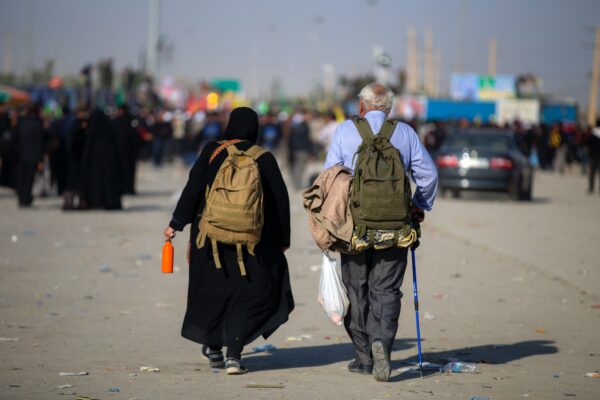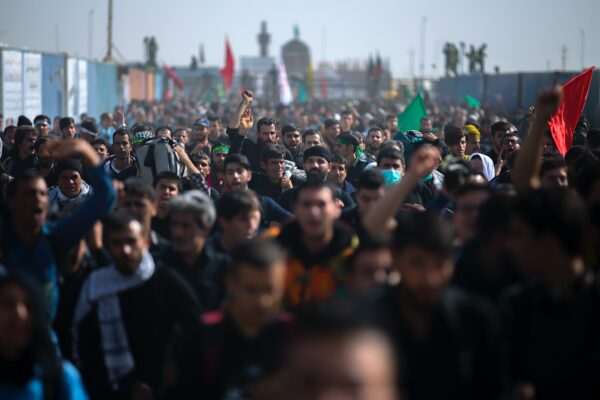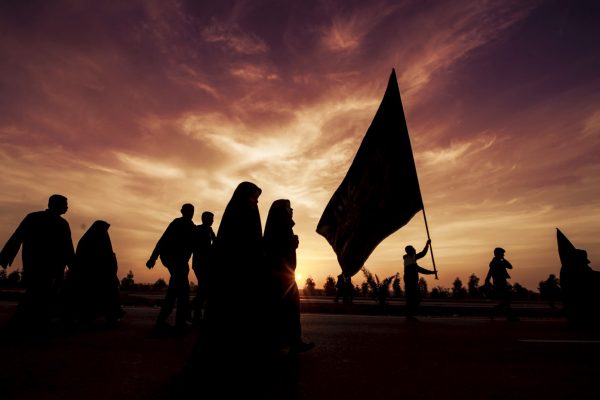Here’s everything you need to know about how to navigate this often complicated but holy month.
Here’s everything you need to know about how to navigate this often complicated but holy month.
Muharram is the first and one of the most important months of the Islamic lunar calendar, commencing the start of a new year. It is very important to Muslims all over the world. The Prophet Muhammad (PBUH) refers to this month as “the Sacred Month of Allah” and it is also referred to as Muharram-ul-Haram.
The month of Muharram is sacred for the Muslim community, and for many, including Shia Muslims, it is a time to grieve the passing of Imam Hussein, the grandson of the Prophet, and his family.
A fierce battle took place in the city of Karbala, Iraq in Muharram, in the 61st year of the Islamic calendar. Hussain and his group were captured by a heavily armed force, and spent three days without food or drink in the desert. The cruel soldiers mercilessly murdered Hussain and his 6-year-old son and took the women with them as captives.
On this day of grief, Shia Muslims honor their sacrifice, offer numerous prayers, and abstain from all celebratory events.
Whether you are a Muslim seeking to deepen your connection to Muharram or an individual curious about Islamic traditions, this guide will provide valuable insights into the observance of Muharram and how to respectfully partake in its commemoration.
What is Muharram?
Muharram is a special place in the hearts of Muslims worldwide as a month of great historical and religious significance. It is derived from the Arabic word “haram,” meaning “forbidden”. It is one of the four sacred months, and its special importance is indicated by its name.
Historically, Muharram is holy, and pilgrims would be able to do Hajj without fear of banditry or war. This ideal was upheld by the Arabs in pre-Islamic times, and Allah confirms it in the Qur’an.
“Surely the reckoning of months, in the sight of Allah, is twelve months, laid down in Allah’s decree on the day when He created the heavens and the earth; and out of these months, four are sacred. That is the true ordainment. Do not, therefore, wrong yourselves, with respect to these months” (Qur’an, 9:36).
Regarding this verse, Imam Ibn Katheer (rh) explains, “Allah has chosen the chosen ones from His creation; He chose messengers from the angels and Messengers (prophets) from mankind; and He chose Zikr (words of remembrance) from the many words; and He chose from the surface of the earth places to make worship (mosques); and He chose Ramadan and the Sacred Months from the months (of the year); and He chose Friday from amongst the days (of the week) and the Night of Power from all the nights (of the year). So glorify what Allah has glorified, because glorifying that which Allah has glorified are amongst the matters of the learned and those of intellect.” (Tafseer Ibn Katheer)
Therefore, Muharram is unique just because Allah has so decided. During this holy month, He warns us not to “wrong ourselves,” which basically means to watch out for our intentions and behavior and to avoid sinning.
Historical Events in the Month of Muharram
Battle of Karbala
The true story of Muharram mourning is a painful one. The violent Battle of Karbala, Iraq, took place on the 10th of Muharram, also known as Ashura, in the 61st year of the Islamic calendar. The battle was fought between a small group led by Imam Hussein Ibn Ali, the beloved grandson of the Prophet Muhammad (PBUH), and a considerably larger army led by Caliph Yazid I of the second Umayyad dynasty.
Imam Hussain’s army was made up of just his friends and relatives, including women and little children. However, they were besieged by a well-equipped enemy army numbering in the thousands. They captured Hussain and his companions and deprive them of water and food for three days in the desert heat. Hussain and his 6-year-old son were brutally murdered by the military, who also took the women with them as captives.
Although Imam Hussain was killed in the battle, his message of empathy, justice, and equality lives on in the hearts of those who love him, and this is his true victory. The first day of Muharram marks the beginning of the mourning period, which lasts for 10 days.
Allah Saved Musa (as) and the Israelites from Pharaoh
Allah parted the Red Sea on ‘Ashura so that Musa (as) and the Children of Israel could escape Pharaoh and his army.
‘Then We inspired to Musa [as], “Strike with your staff the sea,” and it parted, and each portion was like a great towering mountain. And We advanced thereto the pursuers. And We saved Musa [as] and those with him, all together. Then We drowned the others. Indeed that is a sign, but most of them were not to be believers. And indeed, your Lord – He is the Exalted in Might, the Merciful. [ Qur’an, 26:63-68]
Prophet Nuh (Noah) (AS) Left the Ark
‘In a narration reported by Imam Ahmad (rh), it was on Ashura day that the Ark of Nuh (as) came to rest on Mount Judiyy’. [Tafsir Ibn Kathir]
‘And it was said, “O earth, swallow your water, and O sky, withhold [your rain]”. And the water subsided, and the matter was accomplished, and the ship [the ark of Nuh (as)] came to rest on the [mountain of] Judiyy. And it was said, “Away with the wrongdoing people”’. [Qur’an, 11:44]
6 Ways to Commemorate Muharram
Here are six ways in which Muslims commemorate this holy month.
1. Attend Majlis and Processions
Attending Majlis offers an opportunity to deepen one’s understanding of the events surrounding Karbala. The collective act of walking together fosters a sense of community and unity, as participants share in the sorrow and commit to upholding the values for which Imam Hussein sacrificed his life. Through lectures, sermons, recitation of poetry, and recounting of historical accounts, Majlis serves as a means to keep the memory of Karbala alive and ensure its teachings resonate with future generations.
2. Observe Fasting
Fasting on Ashura was practiced even before the emergence of Islam. When different Companions (R.A.) informed the Prophet (S.A.W.) that fasting on the Day of Ashura is praised by Jews and Christians, the Prophet (S.A.W.) encouraged them by saying: “If I live until next year, I will fast the ninth day (of Muharram) too.” (Ibn Majah: 1736)
Unfortunately, the Prophet (SAW) did not get to see the following year. As a result, Muslims regard the 9th and 10th of Muharram as important days in the Islamic calendar and fast on these days. [1134 (a) Sahih Muslim]
Observing fasting particularly during the first ten days in Muharram with special emphasis on the 9th and 10th days known as Ashura is a deeply personal and meaningful practice that aligns with the values exemplified by Imam Hussein and serves as a reminder of the eternal pursuit of justice and righteousness.
This practice carries both historical and spiritual importance, inviting Muslims to engage in self-reflection, empathy, and dedication to the principles exemplified by Imam Hussein.
3. Engage in Charitable Acts
One of the significant aspects of celebrating Muharram is the emphasis on charity and giving. Muharram serves as a reminder of the importance of compassion and generosity towards those in need. Engaging in charitable acts during this sacred month is a way to honor the values upheld by Imam Hussein and contribute positively to society.
4. Recite Ziyarat Ashura and Other Prayers
By reciting Ziyarat Ashura and other recommended prayers and verses, individuals immerse themselves in the spiritual atmosphere of Muharram. Through these spiritual practices, individuals can experience a heightened sense of spirituality and draw inspiration to lead a life rooted in justice, compassion, and righteousness.
Other prayers and verses that hold spiritual significance during Muharram include Du’a al-Nudba, Recitation of Qur’an, Salawat, and Durood, Seeking Forgiveness.
5. Engage in Self-Reflection and Repentance
One of the essential ways to celebrate Muharram is through introspection and repentance. Muharram serves as a time of deep reflection on one’s actions, seeking forgiveness, and making positive changes in one’s life. By engaging in self-reflection and repentance, individuals can align themselves with the values exemplified by Imam Hussein and embark on a journey of personal growth and spiritual renewal.
6. Promote Unity and Harmony
Promoting unity and harmony during Muharram serves as a testament to the values upheld by Imam Hussein and the principles of Islam. This sacred month provides a unique opportunity to bridge divides, promote harmony, and cultivate a sense of togetherness. By organizing interfaith dialogues, community events, and sharing meals, these collective efforts contribute to building a society that values diversity, inclusivity, and social cohesion, ultimately reflecting the spirit of Muharram, a time of empathy, and shared humanity.
Final Thoughts
Commemorating Muharram is a journey of remembrance, introspection, and unity. It offers an opportunity to reflect on the sacrifices of Imam Hussein and his companions, reaffirm our commitment to justice and compassion, and seek forgiveness for our shortcomings.
By engaging in practices such as attending Majlis, fasting, engaging in charitable acts, reciting prayers, and promoting unity, we honor the spirit of Muharram and strive to embody its timeless teachings.





